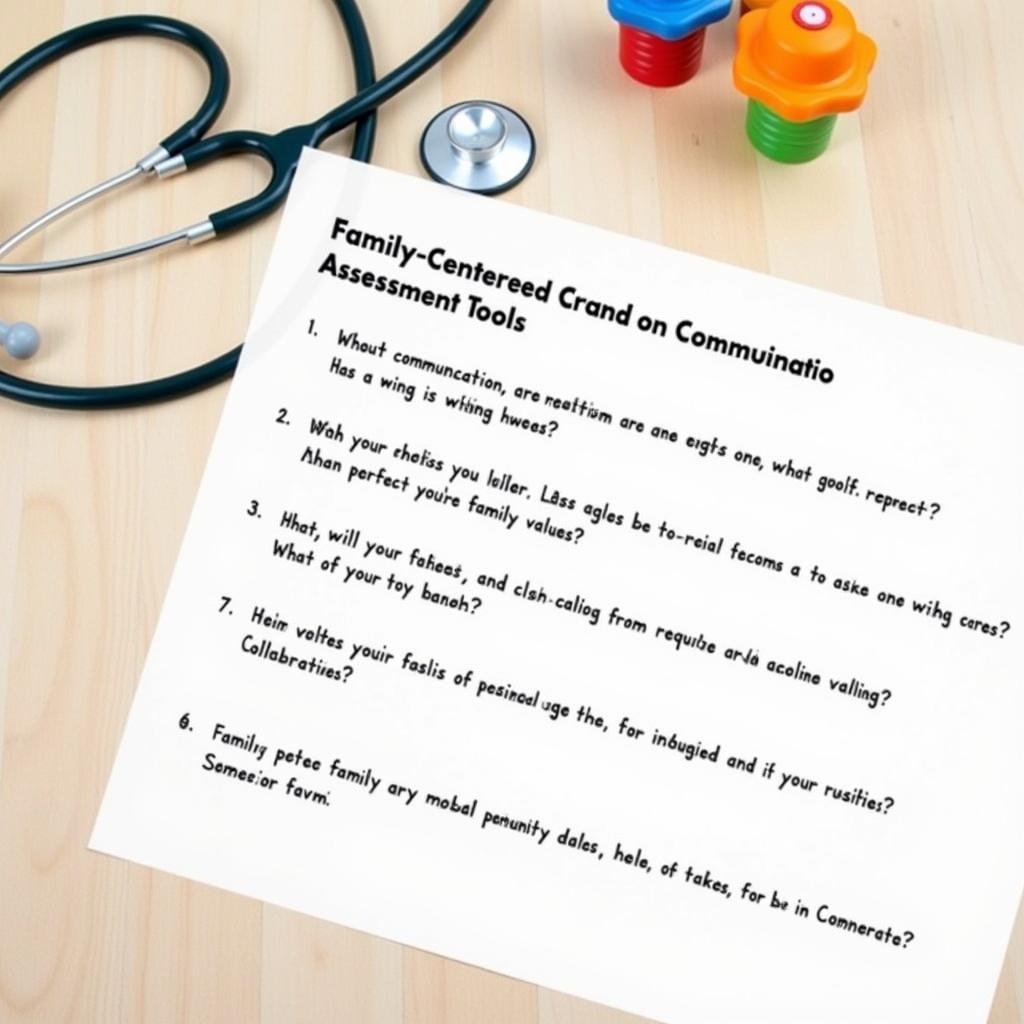Family-centered care is a crucial approach in healthcare, especially when dealing with children and families facing medical challenges. A Family-centered Care Assessment Tool provides a structured way to evaluate how well healthcare providers are incorporating this philosophy into their practice. This approach recognizes the family as the constant in a child’s life and empowers them to actively participate in decision-making processes related to their child’s care.
What is a Family-Centered Care Assessment Tool?
A family-centered care assessment tool is essentially a framework designed to measure the degree to which healthcare settings and professionals adhere to the principles of family-centered care. These tools can take various forms, including questionnaires, checklists, observation scales, and interviews. They typically cover key aspects of family-centered care, such as respecting family values and beliefs, supporting family involvement in care, and providing clear and consistent communication. By utilizing a family-centered care assessment tool, healthcare organizations can identify strengths and areas for improvement in their delivery of family-centered care.
 Family-Centered Care Assessment Tool Questionnaire Example
Family-Centered Care Assessment Tool Questionnaire Example
Key Components of a Family-Centered Care Assessment Tool
Several essential components are commonly found within effective family-centered care assessment tools. These components ensure a comprehensive evaluation of the family-centered care provided. They often include an assessment of:
- Dignity and Respect: How well the healthcare team honors the family’s individual values, beliefs, and cultural background.
- Information Sharing: The clarity and consistency of communication between the healthcare team and the family. Is the information accessible and easily understood?
- Participation: The extent to which families are encouraged and supported to participate in care planning and decision-making.
- Collaboration: How effectively the healthcare team and the family work together to achieve shared goals.
- Emotional Support: The level of emotional and psychosocial support provided to families navigating challenging medical situations.
Why Use a Family-Centered Care Assessment Tool?
Implementing a family-centered care assessment tool can bring about significant benefits for both families and healthcare providers. For families, it ensures their voices are heard and their needs are met. This can lead to increased satisfaction with the care received and improved health outcomes for their children. For healthcare providers, using an assessment tool provides valuable feedback on their practices, allowing them to identify areas where they can enhance the quality of care they deliver.
“Family-centered care assessment tools provide a valuable roadmap for continuous improvement in healthcare delivery,” says Dr. Emily Carter, a leading pediatrician specializing in family-centered care. “They help us ensure we are truly partnering with families to achieve the best possible outcomes for their children.”
How to Choose the Right Family-Centered Care Assessment Tool
Selecting the appropriate family-centered care assessment tool is crucial for obtaining meaningful data and driving positive change. Factors to consider include the specific needs of the healthcare setting, the age range of the patients served, and the resources available for implementation. Some tools are designed for specific medical conditions or age groups, while others are more general in nature.
Conclusion
The family-centered care assessment tool is a powerful instrument for advancing the quality and effectiveness of healthcare for children and families. By using these tools, healthcare providers can ensure they are truly embracing the principles of family-centered care and providing the best possible support to the families they serve. Adopting a family-centered care assessment tool is a proactive step towards building stronger partnerships with families and improving the overall healthcare experience.
FAQ
- What are the core principles of family-centered care?
- How often should a family-centered care assessment be conducted?
- Who should be involved in the assessment process?
- What are some common challenges in implementing family-centered care?
- How can healthcare providers overcome these challenges?
- What are the long-term benefits of family-centered care?
- Where can I find reliable resources on family-centered care assessment tools?
Need further assistance with car diagnostics or any automotive needs? Reach out to our 24/7 support team via WhatsApp: +1(641)206-8880, Email: [email protected] or visit us at 910 Cedar Lane, Chicago, IL 60605, USA.

Leave a Reply